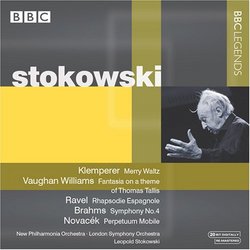| All Artists: Otto Klemperer, Ralph Vaughan Williams, Maurice Ravel, Johannes Brahms, Ottokar Novacek, Leopold Stokowski, New Philharmonia Orchestra, London Symphony Orchestra Title: Stokowski Conducts Klemperer, Vaughan Williams, Ravel, Brahms, Nov�cek Members Wishing: 0 Total Copies: 0 Label: BBC Legends Original Release Date: 1/1/2007 Re-Release Date: 4/24/2007 Genre: Classical Styles: Forms & Genres, Concertos, Historical Periods, Modern, 20th, & 21st Century, Symphonies Number of Discs: 1 SwapaCD Credits: 1 UPC: 684911420524 |
Search - Otto Klemperer, Ralph Vaughan Williams, Maurice Ravel :: Stokowski Conducts Klemperer, Vaughan Williams, Ravel, Brahms, Nov�cek
 | Otto Klemperer, Ralph Vaughan Williams, Maurice Ravel Stokowski Conducts Klemperer, Vaughan Williams, Ravel, Brahms, Nov�cek Genre: Classical
|
Larger Image |
CD Details |
CD ReviewsStokowski near the end remains great -- a must-listen for fa Santa Fe Listener | Santa Fe, NM USA | 04/11/2010 (5 out of 5 stars) "Stokowski had just turned 9 when the bulk of this concert from Albert Hall was recorded (the Novacek item is from ten years earlier). He retained is control and style, and the only sign of age was a tendency to rush, as if to make sure the audience knew how vigorous he remained. In every respect the program is a revisit to strength -- Stokowski had always been a master at Ravel and Vaughan Williams. Because of his famous string sonority, based on free bowing, it's no wonder that the Fantasia on a Theme by Thomas Tallis is as rich as warm butterscotch. But there's also good rhythmic control, so the long melodic lines never become droopy or soupy. The only flaw is that dynamics remain on the same, fairly loud plane, neglecting the rise from hushed softness to climactic grandeur that shows the work off at its best.
In Ravel Stokowski never attempted to imitate the French; he has his won coloristic style, bolder and brighter. The pure Gallic idiom belongs to Martinon and Monteux, and Karajan extracted unbelievable refinement, but Stokowski's Rapsodie espagnole has more inner life and drama than either. the London Sym. as always been skilled in French music -- after all, they appointed Monteux their music director in his eighties -- and here the concert reading is full of atmosphere and beautifully played. The detailed liner notes point out that Klemperer and Stokowski were poles apart as conductors, which hardly needs saying, but more surprisingly that the unbending, forbidding Klemperer admired the publicity hound and Disney movie star Stokowski. Klemperer was a composer, and his only semi-popular work, the cheerful, echt Viennese Merry Waltz, makes a touching start to the program, in tribute to Klemperer, who has died the summer before at 88. The main work, the Brahms fourth, lies outside Stokowski's kingdom; he played the German classics but never made Mozart, Beethoven, or Brahms the center of fascination, and except for the Schumann Second, he avoided tht composer's music on disc. In his glory years with Philadelphia he was bold enough to pull Brahms in strange directions, but in general Stokowski was respectful. His arc rival Toscanini had set a fashion for quick, even hectic tempos, and this performance of the Fourth Sym. is in that mold, although Stokowski is more relaxed, even at high speed. The reading has plenty of vigor and extroverted energy but is short, perhaps, on careful phrasing and emotional depth. Happily Stokwski brings sweep and excitement to the finale, and one can't help but be touched, realizing that this was his next to last public concert. the last came a year later in Rouen when he conducted some of is signature Bach transcriptions. Valuable as a memento, this CD also captures in 78 min. a satisfying vision of Stokowski's art. The bBC's stereo sound is excellent, with a suggestion of the spacious reverberation heard in the immense London hall." |

 Track Listings (11) - Disc #1
Track Listings (11) - Disc #1